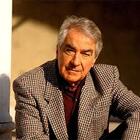
Álvaro Mutis Jaramillo. (Bogotá, August 25, 1923 - Mexico City, September 22, 2013). Colombian poet, novelist and journalist.
He studied in Brussels. Later he moved to Bogotá and lived since 1956 in Mexico, where he alternated writing with work in various companies. The memories of his childhood in Belgium mark one of the main themes of his work, the contrast between Europe and America.
Mutis was linked to the young poets who revolved around the magazine Mito, founded in 1955 and directed by Jorge Gaitán Durán, and continued to publish books of poems such as Los elementos del desastre (1953) - where Maqroll the gaviero, the character who has never left Mutis - or Memoria de los hospitales de ultramar (1959) appeared for the first time. Around 1960 a shift from poetry to prose began to take place in him. He published the Diario de Lecumberri (1960) and Los trabajos perdidos (1961).
His next books are of poetry: Caravansary (1982), The Emissaries (1984), Chronicle and Praise of the Kingdom (1985), and A Tribute and Seven Nocturnes (1987). In 1983 he was awarded the National Poetry Prize of Colombia, and three years later the Médicis Prize for the best foreign novel in France for The Admiral's Snow. The Universidad del Valle named him Doctor Honoris Causa in Letters in 1988, and later the University of Antioquia. In these years his novels Ilona llega con la lluvia (1988), Un bel morir (1989), La última escala del Tramp Steamer (1990) - a work for which he received the Javier Villa Urrutia Prize -, Amirbar (1990) and Abdul Bashur, soñador de navíos (1991) saw the light. Among others, he received the Roger Caillois Prize, awarded by the city of Reims for his body of work, the Order of Arts of France and the Aztec Eagle of Mexico.
In 2001 he was awarded the Cervantes Prize for his contribution to literature in the Spanish language, and two years later he received the Legion of Honour in the rank of officer, the highest distinction awarded by the French government.
On September 22, 2013, Álvaro Mutis died in Mexico, where he had lived for more than fifty years.




